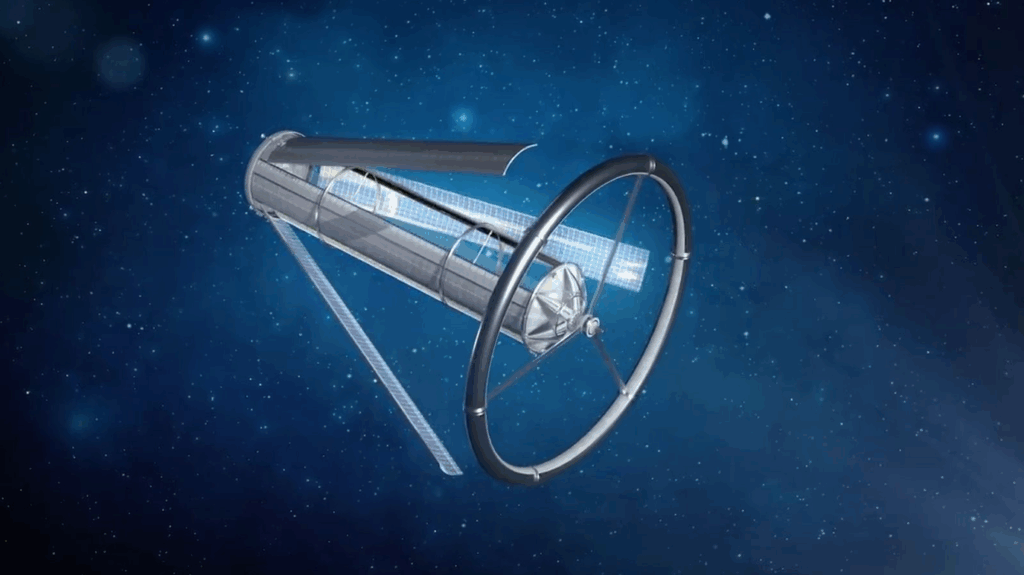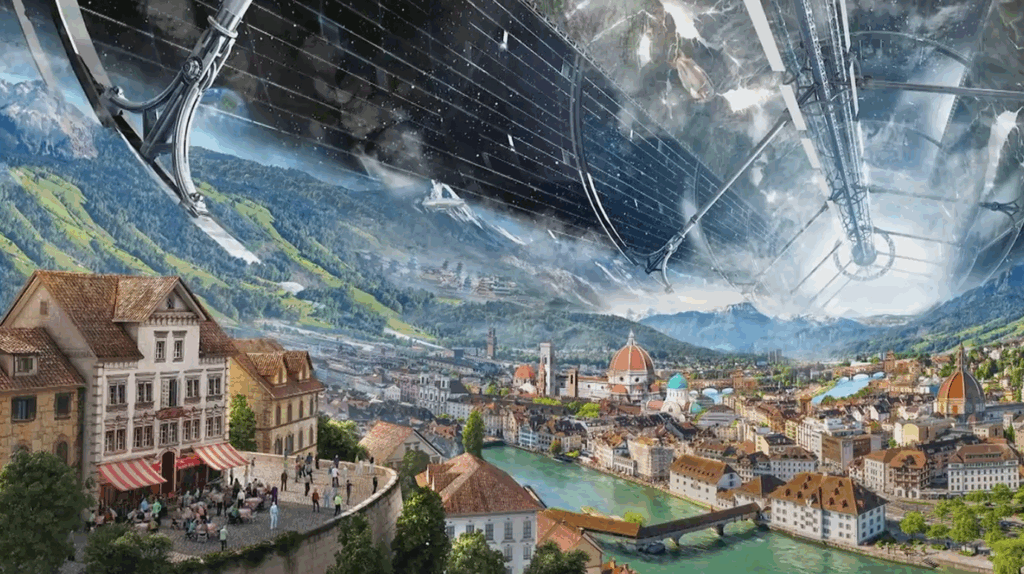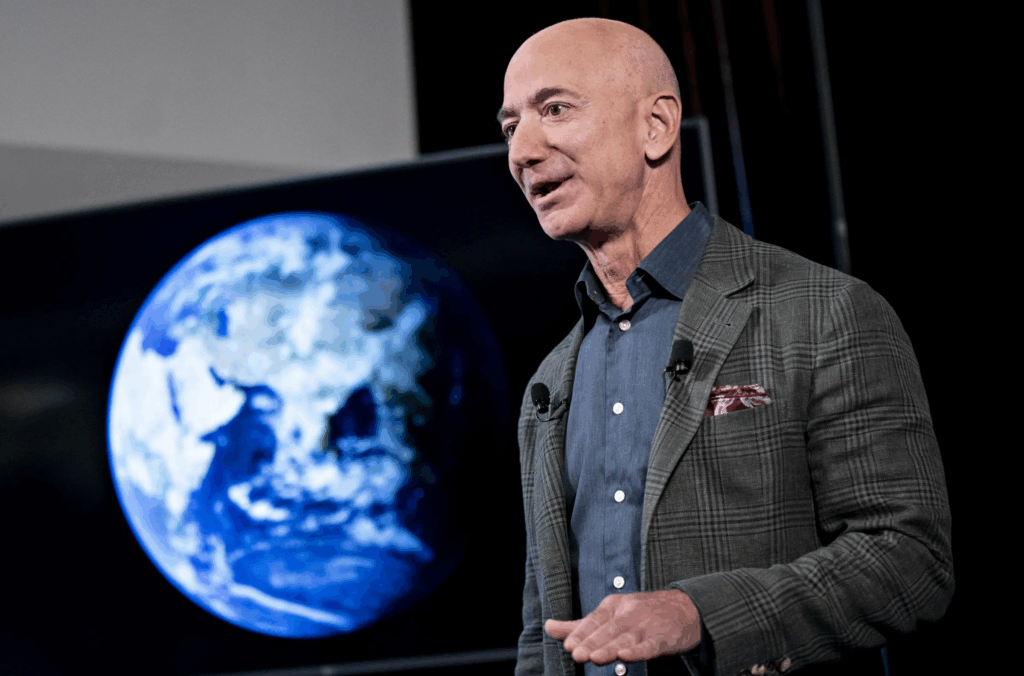Jeff Bezos, the founder of Amazon and Blue Origin, is reigniting a radical proposition: moving polluting heavy industries from Earth into space to preserve our planet as a pristine residential zone. This concept, far from science fiction for some, offers a stark contrast to Elon Musk’s Mars colonization aspirations, aiming not for escape, but for a profound re-organization of Earth itself.
Bezos envisions Earth shedding its role as a manufacturing hub, becoming a tranquil sanctuary devoid of factories, smoke, and industrial noise. All heavy industry, mass production, and resource extraction, including mining, would be relocated to self-sufficient, orbiting space colonies, potentially inspired by O’Neill cylinders. These colossal structures would simulate gravity and host human life, eliminating the need to “terraform” distant planets, a notion Bezos dismisses as impractical.
“We can operate in space,” Bezos asserted after his 2021 suborbital flight, emphasizing the feasibility and necessity of this industrial exodus. His company, Blue Origin, is actively developing technologies to drastically reduce launch costs and establish the foundational infrastructure for off-world manufacturing and resource utilization, including asteroid mining and orbital solar energy generation. While acknowledging that this is a multi-century endeavor, Bezos stresses the imperative of beginning now.
Ecological Impact and Opportunities for Earth
The potential ecological impact of Bezos’s vision is monumental, offering a pathway to unprecedented planetary restoration:
Atmospheric Restoration
Removing industrial emissions from Earth’s atmosphere would dramatically reduce greenhouse gases, smog, and airborne pollutants. This could lead to a rapid improvement in air quality, potentially reversing climate change effects and mitigating respiratory illnesses. Cities could experience cleaner skies, and global temperatures might stabilize over time.
Terrestrial Ecosystem Recovery
The cessation of industrial activities, heavy manufacturing, and particularly large-scale mining on Earth would allow vast swathes of land to naturally rewild. Forests could regenerate, biodiversity could flourish, and natural hydrological cycles could be restored, leading to healthier ecosystems and potentially combating desertification. Former industrial zones could be transformed into green belts, nature reserves, or sustainable urban developments.
Oceanic Health Improvement
Reduced industrial runoff, wastewater discharge, and airborne pollution settling into oceans would significantly improve marine water quality. This could lead to the recovery of coral reefs, reduction in ocean acidification, and a resurgence of marine life. Fisheries could become more sustainable, and marine biodiversity could rebound.
Freshwater Preservation
Industrial processes are often heavy consumers and polluters of freshwater. Moving them off-world would free up immense quantities of clean water for human consumption, agriculture, and natural ecosystems. Rivers and lakes could recover from decades of contamination, and groundwater reserves could be replenished.
Waste Management Revolution
While space industry would generate its own waste, the removal of terrestrial heavy industry would drastically cut down the volume and toxicity of waste generated on Earth, simplifying terrestrial waste management challenges. Landfills could be reduced, and recycling systems could become more efficient and less hazardous.

Key Metrics for a Future Earth-Only Ecosystem
To track the success of such a paradigm shift, several key ecological metrics would become central:
- Atmospheric CO₂ Concentration (ppm): A primary indicator, aiming for levels consistent with pre-industrial or even healthier climate baselines.
- Biodiversity Index (e.g., Living Planet Index): Measuring the recovery and expansion of species populations across terrestrial and marine environments.
- Ocean pH Levels: Tracking the reversal of ocean acidification.
- Water Quality Index: Comprehensive assessment of freshwater and marine bodies, free from industrial pollutants.
- Percentage of Reforested/Rewilded Land: Quantifying the return of natural habitats.
- Industrial Waste Generation (Terrestrial): Aiming for near-zero heavy industrial waste production on Earth.
These metrics would not only guide policy but also serve as benchmarks for ecological progress, helping governments and organizations align with planetary health goals.
Opportunities for the Future of Ecology
This vision presents radical opportunities for the field of ecology:
Large-Scale Ecological Restoration
Ecologists would lead unprecedented projects to restore degraded lands, reintroduce native species, and manage recovering ecosystems on a planetary scale. This involves pioneering new techniques for ecosystem engineering and rewilding. Restoration ecology could become one of the most vital scientific disciplines of the 21st century.
Novel Ecosystem Management
As humans adapt to a “residential Earth,” ecologists would guide the design of sustainable human settlements that integrate seamlessly with natural systems, promoting urban biodiversity and green infrastructure. Cities could evolve into eco-habitats, blending technology with nature.
Advanced Environmental Monitoring
The need for precise global monitoring of air, water, soil, and biodiversity would intensify, driving innovation in remote sensing, AI-driven data analysis, and citizen science platforms. Satellites, drones, and IoT sensors could provide real-time ecological data, enabling proactive environmental stewardship.
Sustainable Agriculture and Resource Management
Without the burden of heavy industry, ecological principles would profoundly influence future agricultural practices (e.g., regenerative agriculture, permaculture) and the management of remaining terrestrial resources, focusing on circularity and minimal impact. Food systems could become more localized, resilient, and biodiversity-friendly.
Planetary Health Research
Research would pivot towards understanding the complex interactions within a truly biodiverse and regenerating Earth, offering insights into planetary self-regulation and resilience. This could unlock new solutions for existing environmental challenges, from climate adaptation to disease prevention.

Technological and Economic Challenges
Despite its promise, Bezos’s vision faces formidable technological and economic hurdles:
- Launch Costs and Infrastructure: Although reusable rockets have reduced costs, scaling up to industrial levels requires massive investment and innovation in propulsion, space habitats, and orbital logistics.
- Energy Generation and Storage: Off-world industry would need reliable, scalable energy sources—likely solar power harvested in space and transmitted wirelessly to Earth or used locally.
- Material Transport and Processing: Mining asteroids and processing materials in microgravity environments pose engineering challenges that are still being researched.
- Economic Incentives: Governments and corporations must be incentivized to invest in space industry, which may require new economic models, public-private partnerships, and long-term planning.
- Regulatory Frameworks: International space law must evolve to address ownership, environmental impact, and ethical considerations of off-world activities.
Philosophical and Ethical Dimensions
Bezos’s proposal also invites deep philosophical reflection:
- What is Earth’s purpose? Should our planet be preserved as a sanctuary, or continue as a site of economic activity?
- Who decides what industries move off-world? Equity and representation in space governance will be crucial.
- How do we ensure space doesn’t become a new frontier for exploitation? Ethical frameworks must guide the development of space industry to avoid repeating terrestrial mistakes.
Conclusion: A Civilizational Choice
While this future remains centuries away, the intensifying climate crisis lends a pragmatic urgency to such “radical solutions.” As experts increasingly consider the viability of off-world industry, the debate between Musk’s intergalactic escape and Bezos’s terrestrial restoration highlights a fundamental question: how do we, as a civilization, choose to coexist with our singular habitable planet?
Bezos’s vision is not merely about technology—it’s about redefining humanity’s relationship with Earth. It challenges us to imagine a world where nature thrives, cities breathe, and industry hums quietly in the void of space. Whether this vision becomes reality depends not only on innovation but on our collective will to prioritize planetary health over short-term gain.
Related Videos
Related Content
- Jeff Bezos’s Vision of the Future Is Basically Blade Runner
- China’s Breakthrough in Space Propulsion: A Potential Game-Changer for Space Travel
- Space-Based Solar Power: A Revolutionary Leap in Energy Production
- A View from Above: How 178 Days in Space Changed an Astronaut’s Perspective on Humanity
- Digital Innovation in Urban Spaces: The Crucial Role of IT in Smart Cities
- SpaceX’s Starship Embarks on a Momentous Journey
- Boeing’s Evolving Legacy: From Aerospace Excellence to Ongoing Turbulence
- Exploring the Therapeutic Impact of Urban Green and Blue Spaces on Older Adults: A Comprehensive Analysis from Washington State University
- Top Mini Washing Machines and Dryers for September 2023: Your Space-Saving Laundry Solution
- Building a Greener Future: Benchmarking the Top 40 Sustainable Companies and Exploring Opportunities, Challenges & Eco-Friendly Brands
- Love in the Age of Algorithms: When AI Becomes a Partner—and What It Means for Our Planet
- Vevor Wind Turbine: A Budget-Friendly Alternative to Home Solar?
- Is AI the Green Energy Guru We’ve Been Waiting For? (Or Just Another Power-Hungry Tech?)
- Jeff Bezos lays out his vision to take millions of people to the stars and beyond – 311 Institute
- Blue Origin, Jeff Bezos unveils plans for space colonization – ABC News
- Is Jeff Bezos’ Blue Origin the Future of Space Exploration?
- Home | Blue Origin
- Blue Origin: Jeff Bezos’ Space Company’s History, Rockets, Launches – Business Insider

